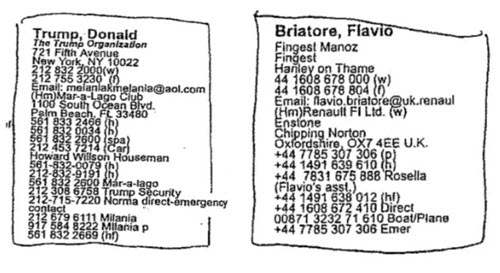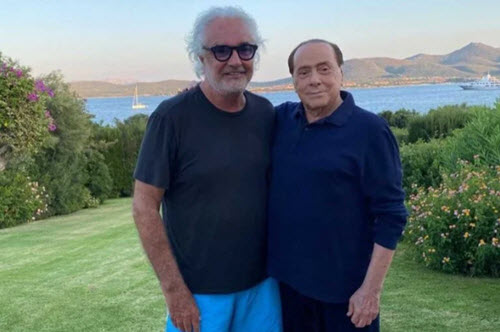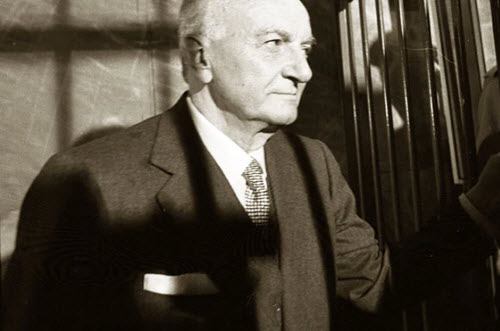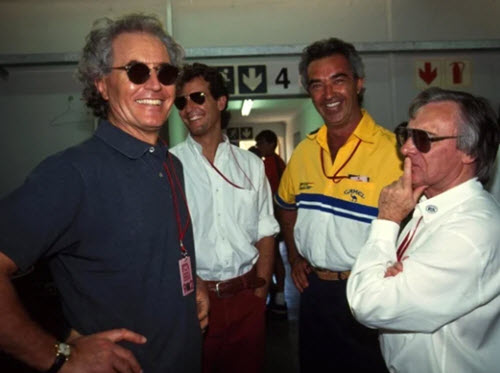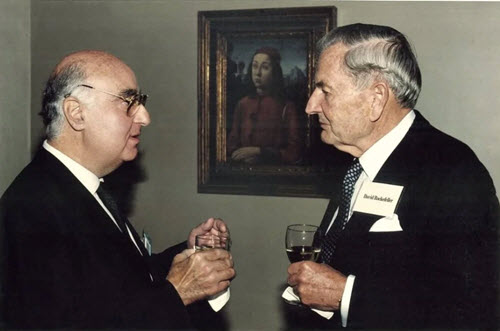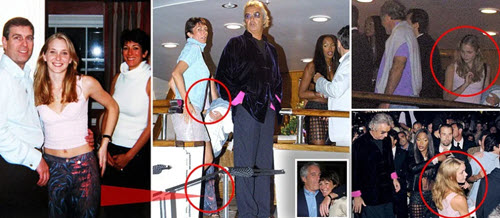by Whitney Webb
August 8, 2022
[x]
The following is an adapted excerpt from Whitney Webb’s upcoming book, One Nation Under Blackmail, which examines the network behind Jeffrey Epstein and traces it back to the merging of American organized crime and intelligence beginning in the early 1940s. In this excerpt, Whitney examines the Wexner Foundation’s origins and the ties of Leslie Wexner’s philanthropy and Jeffrey Epstein to Harvard as well as the now infamous Young Global Leaders program of the World Economic Forum. Whitney’s book can be pre-ordered here, here or here.
The Origins of the Wexner Foundation
It is hard to know exactly when the Wexner Foundation was originally created. The official website for the foundation states clearly in one section that the Wexner Foundation was first set up in 1983 alongside the Wexner Heritage Foundation. However, the 2001 obituary of Wexner’s mother, Bella, states that she and her son created the foundation together in 1973. Regardless of the exact year, Wexner’s mother, Bella, became the secretary of the foundation (just as she had with his company The Limited), which Wexner wanted people to refer to as a “joint philanthropy.”
The foundation’s website states that the original purpose of the Wexner Foundation was to assist “emerging professional Jewish leaders in North America and mid-career public officials in Israel.” Per the website, Wexner’s main philanthropic endeavors were created after Wexner “reached the conclusion that what the Jewish people needed most at that moment was stronger leadership.” As a result, Wexner sought to focus his foundation’s attention chiefly on the “development of leaders.” As a consequence of this, Wexner’s programs have molded the minds and opinions of prominent North American, as well as Israeli, Jewish leaders who went on to work at the top levels of finance, government and, even, intelligence.
One of the Wexner Foundation’s original advisors, and perhaps one of the most important, was Robert Hiller, who had previously been executive vice president of the Council of Jewish Federations and Welfare Funds. Robert I. Hiller was described in an article in The Baltimore Sun as a “nonprofit leader who helped develop community fundraising strategies and was active in the Soviet Jewry movement.”
As well as being known as a community development leader, Hiller was also an executive with Community Chest of Metropolitan Detroit in 1948. In that position, Hiller helped bring together corporations such as General Motors to create “social service groups under an umbrella organization, a precursor to collective fundraising efforts today.” In 1950, Hiller became the associate director of the Jewish Community Federation of Cleveland and six years later he also joined the United Jewish Federation of Pittsburgh. He would spend another nine years in that position before his move to Baltimore.
In his autobiography, Hiller wrote about his extensive dealings with various Israeli heads-of-states, saying: “I had pictures of every Israeli Prime Minister from David Ben Gurion to Menachem Begin. I would have many more with Begin because he was the current Prime Minister. My favorite picture, however, (it was to be hung) was taken in Washington, D.C. at a gala party where Marianne and I were with the then Ambassador, Yitzhak Rabin, and his wife, Leah.”
Hiller was extremely proactive when it came to seeding suitable, high ranking candidates for appropriate positions in Jewish community organizations, a task that the Wexner Foundation would later reproduce on a grand scale via its various Fellowship programs and subsequently apply to the worlds of business and government. One example of this matchmaking was the appointment of Larry Moses as assistant to Rabbi Maurice Corson. Corson is credited as having co-founding the Wexner Foundation with Leslie Wexner in 1983, per the foundation’s website, and he served as its first president. After Corson left that post, Moses stepped in to serve as the foundation’s president.
[x]
Maurice Corson and Leslie Wexner in an undated photo, Source: The Wexner Foundation
Hiller wrote in his autobiography that he had “personally enticed” Moses to become Rabbi Corson’s assistant and this later resulted in Larry Moses becoming the executive vice president of the Wexner Foundation. When Hiller was 33 years-old, he was presented with an opportunity to become a member of the Big 16, which was classed as an informal grouping of the 16 largest communities in North America headed by prominent Jewish executive members. One of the people who Hiller connected with the Wexner Foundation was originally meant to lead the Big 16 Federation, Fern Katelman. Katelman declined this prestigious leadership role in order to join Larry Moses, where he became his assistant at the Wexner Foundation.
Hiller, when revisiting his life, would state: “One of the most stimulating relationships I had was with the Wexner (Leslie) Foundation of Columbus, Ohio, and New York City. Rabbi Maurice Corson was the foundation president. My relationship with him started in Baltimore where he had been a new rabbi for one of the city’s largest Conservative synagogues. He came from Philadelphia with an interesting background and credentials.”
Hiller goes on to write: “He [Corson], however, seemed bored and uneasy with the routine of being a synagogue rabbi. When he and the congregation decided to part company, I assisted in getting him an executive position with the United Israel Appeal of Canada. He did so well that he was recruited to return to the U.S.A. in an executive position with International B’nai B’rith. Leslie Wexner met him through his work with B’nai B’rith, and when Les began to put together a formal foundation, he engaged Rabbi Corson as the chief executive.” B’nai B’rith is a “Jewish fraternal organization” that was founded in the 19th century and is modeled as a secret society, leading some to compare the group to the freemasons.
Hiller went on to assist Corson in the initial stages of setting up the Wexner Foundation while they put together “a distinguished advisory group” with the group meeting in Columbus, Ohio, and New York City. Hiller describes assisting Corson in creating the foundation, which Hiller called: “an unusual foundation with its own agenda and programming.” After several years of service to the Wexner Foundation, Hiller retired from his consultancy role and was replaced by Philip Bernstein, the former executive of the Council of Jewish Federations and Welfare Funds (CJF).
Now, it makes sense to examine Rabbi Maurice S. Corson himself. Corson was a prominent Jewish educator who, as previously mentioned, already had associations with various Jewish welfare organizations prior to serving as co-founder and then president of the Wexner Foundation. Corson had been ordained as a rabbi in 1960 through the Jewish Theological Seminary, after previously studying at the University of Cincinnati where he graduated in 1955. By 1964, Corson had become the president of the Religious Education Society in Seattle, and he remained in that position until 1966.
Over the following decade, he began working for the Zionist Organization America in Atlantic City and, shortly thereafter, became the Senior Rabbi at the Chizuk Amuna Congregation, a position he held from 1976 until 1979. Around this time, Hiller helped Corson get an executive position with the United Israel Appeal of Canada, where he went on to work for only a year before joining B’nai B’rith.
Once recruited into serving a leadership role within the influential “secret society,” Corson worked as director of development for B’nai B’rith International, based in New York City, between 1980 until 1985. During this very period, the board of overseers of B’nai B’rith included Edmond Safra, a notorious banker with close ties to Robert Maxwell and later Jeffrey Epstein; Edgar Bronfman, scion of the family behind Seagrams whose fortunes have long been tied organized crime and Max Fisher, a Detroit businessman who re-launched the Jewish Agency, worked as a “private” diplomat on Israel matters and later served as a mentor to Leslie Wexner.
As noted previously, while Corson was at B’nai B’rith, he first met Leslie Wexner, who persuaded him to co-found the Wexner Foundation (per the version of events on the foundation’s website). Although he had been recruited by Wexner and subsequently left the B’nai B’rith organization, Corson became a member of the executive committee of B’nai B’rith Hillel Commission in Washington in 1987.
Another key figure who is important to mention is the co-founder of the Wexner Heritage Foundation, Rabbi Herbert A. Friedman. Depending on which part of the Wexner Foundation site you visit, that Foundation is listed as having been founded in either 1983 or 1985. However, Friedman is clearly listed as the co-founder of the foundation and as having served as its president for a decade.
The Wexner Heritage Foundation, per its https://web.archive.org/web/20220103195922/https://www.wexnerfoundation.org/our-story/website, was created “to strengthen volunteer leaders in the North American Jewish Community.” It spawned the Wexner Heritage program, which “provides young North American Jewish volunteer leaders with a two-year intensive Jewish learning program, deepening their understanding of Jewish history, values, and texts and enriching their leadership skills.”
Friedman was a US Army chaplain during World War II and also served as an “adviser on Jewish affairs to General Lucius D. Clay, the commander of American occupation forces in Germany.” He was later personally recruited by David Ben-Gurion, who went on to serve as Israel’s first Prime Minister, to join the paramilitary group, the Haganah. The Haganah was the pre-cursor to the Israeli military and was armed in large part by organized crime-linked networks. Per the New York Times, “as a member of the Haganah, Rabbi Friedman participated in the Aliyah Bet, the illegal transport of European Jews to Palestine.”
From 1954 to 1971, Friedman was the chief executive of the United Jewish Appeal (UJA) and, in that role “raised more than $3 billion to support the fledgling state of Israel.” During this period, UJA was intimately involved in the relaunching of the Jewish Agency by Wexner’s mentor Max Fisher in 1970. Fisher was also intimately involved with the related United Israel Appeal. Throughout the 1980s, Wexner was “one of the largest individual contributors to the United Jewish Appeal in America” and, after creating the Wexner Heritage Foundation with Friedman, Wexner became UJA’s vice chairman.
While Wexner was serving in these capacities, he was also engaged in closed door meetings with the highest levels of Israeli leadership, not just about “philanthropy,” but also about his business interests. One specific meeting saw him meet with top Israeli government officials about “Chinese and Israeli interests” working with his company, The Limited, to establish factories in the occupied Golan Heights.
Notably, the Wexner Foundation has direct and controversial ties to at least one former Israeli head of state, Ehud Barak, who was intimately involved with Jeffrey Epstein and an alleged participant in his sex trafficking operation. As reported by https://www.israeltoday.co.il/read/epstein-barak-and-the-wexner-foundation/Israel%20Today in 2019:
“[Barak’s ties to the Wexner Foundation] became an issue only after right-wing journalist Erel Segal called last October to investigate the $2.3 million ‘research’ grant Barak received from the Wexner Foundation, which has in turn for years been the beneficiary of Epstein’s financial contributions. According to Segal, the grant under question was given to Barak in 2004-2006, when he held no public position. Barak insists he has no authority to disclose details about this grant. Only the Wexner Foundation can, if they so choose (they choose silence).”
Developing Leaders
Set up simultaneously alongside the Wexner Foundation, Wexner’s Heritage Program (WHP) planned to connect American Jews with the ever expanding nation-state of Israel. The program was created so as to “expand the vision of Jewish volunteer leaders, deepen their Jewish knowledge and confidence and inspire them to exercise transformative leadership in the Jewish community.” The foundation defines the program as: “essentially a Jewish learning and leadership development program for volunteer leaders in North America.”
There have been, to date, around 2000 “leaders” who have taken part in the program. The WHP is a vehicle for standardizing a certain perspective on the history of Israel, as well as Judaic texts. The two year program is made up of 36 evening seminars, which occur bi-monthly for four-hour periods, as well as three short-term and out-of-town summer institutes hosted in either the US or Israel. Each of these summer institutes are between 5 and 7 days long and take place throughout the program.
As with other well-founded leadership programs, such as the World Economic Forum’s Young Global Leader program, the Wexner Heritage Program targets a very specific age group, aiming at professionals who are generally between the ages of 30 and 45 years-old. Some of the most important criteria required of program participants include showing a demonstrated commitment to Judaism, the Jewish community and/or Israel and a track record of leadership in Jewish communal life.
The Wexner Foundation website claims that:
“The 2,300 Alumni of the Wexner Heritage Program are top lay leaders at the local, national and international level. In the 35 cities where we have convened WHP cohorts, virtually every Jewish communal organization continues to be supported by our alumni. They become presidents or chairs of synagogues, Federations, JCC’s, Hillels, day schools, camps and more; they often are founders or chairs of allocations or annual campaigns. They serve on the boards of JFNA, 70 Faces Media, the Foundation for Jewish Camp, International Hillel, AIPAC and J Street; The Shalom Hartman Institute, Pardes, Hadar and every US rabbinical seminary; the Jewish Education Project, Prisma, the JDC and so many more.”
It is worth noting that, of those aforementioned groups, the Wexner Foundation (and especially the Wexner Heritage program) enjoys particularly close ties to AIPAC. For instance, Elliot Brandt, AIPAC’s national managing director, is an alumnus of the Wexner Heritage Program and, in a 2018 speech at that year’s AIPAC policy conference, Brandt noted that “most of the [AIPAC] National Board consists of Wexner Heritage Alumni, not to mention its regional chairs and some of its most committed donors as well.”
[x]
Elliot Brandt and Alan Dershowitz at the 2017 AIPAC policy conference, Source: Screenshot
Wexner’s close ties to AIPAC take on a different tone when one considers, not only his close association with the Israeli intelligence-connected Jeffrey Epstein, but also the fact that AIPAC itself has long-standing and controversial ties to Israeli intelligence. For instance, AIPAC was at the center of an Israeli espionage scandal in the US in the mid-1980s as well as again in 2004, when a high-ranking Pentagon analyst was caught passing highly classified information over to Israel’s government via top officials at AIPAC.
Despite extensive evidence, particularly in the latter case, AIPAC itself avoided charges. As journalist Grant Smith noted at the time, “the Department of Justice’s chief prosecutor on the [AIPAC] espionage case, Paul McNulty, was suddenly and inexplicably promoted within the DOJ after he backed off on criminally indicting AIPAC as a corporation.” The charges against the specific AIPAC officials involved were also dropped.
In the years after the Wexner Heritage Program was launched, other similar efforts followed. In 1987, the Wexner Foundation announced it would begin channeling “$3-$4 million in grants to the first year of a program dedicated to the enhancement and improvement of professional leadership in the North American Jewish community.”
Per the Jewish Telegraphic Agency, “Wexner said an Advisory Group drawn from among leading Jewish academicians and communal professionals recommended that attention be focused on three critical groups: rabbis, communal professionals and educators.” These efforts would result in the formal creation of the Wexner Graduate Fellowship in 1988. Chairmanship of the Wexner Fellowship Committee was given to Professor Henry Rosovsky.
Henry and Harvard
Henry Rosovsky was an economist at Harvard University. Like Wexner, and like many other of the Wexner Foundation’s associates, Rosovsky was born to Russian Jewish parents. He grew up speaking Russian, German, and French and, in 1940, Rosovsky emigrated to the United States of America with his parents.
During World War II, he served in Counterintelligence Corps of the US Army. He became a naturalized US citizen 9 years later. That same year, he received his B.A. degree from the College of William and Mary public research university in Williamsburg, Virginia, followed by his PhD from Harvard in 1959.
Rosovsky taught overseas as a visiting professor in Japan at Hito Subashi and Tokyo Universities, and subsequently taught Japanese studies, economics and history at the University of California at Berkeley until 1965. He also taught at the Hebrew University of Jerusalem in Israel, again as a visiting professor, as well as working as a consultant with the United States government, the Asian Development Bank, the World Bank, and UNESCO.
Rosovsky settled down into his eventual career at Harvard in 1965 and brought with him the intention of making Jewish life at Harvard flourish. By 1978, Rosovsky had helped to establish the Center for Jewish Studies, which was led by Harry Wolfson, the first chairman of a Judaic studies center at any American college. Rosovsky was the first Jew to serve on the board of the Harvard Corporation. Rosovsky’s wife, Nitza Rosovsky, also had a presence at Harvard, and in 1986, during Harvard’s 350th anniversary celebrations, she wrote a piece entitled “The Jewish Experience at Harvard and Radcliffe,” which traces the Jewish history at the university dating back to the 1720s.
[x]
Henry Rosovsky posing with Israeli Prime Minister Menachem Begin, Source: Harvard Hillel
Rosovsky developed a close relationship with some key faculty members at Harvard, including future US Treasury Secretary and Harvard president Larry Summers. In 2017, Summers stated in a video tribute to Rosovsky the following: “Thirty-five years ago, I sat in your office as a young recruit to the Harvard faculty, and I was trembling with the majesty of it all,” he said. “Over time I became less intimidated and came to value your wisdom and your experience.”
Rosovsky became involved with the Wexner Foundation in 1987, when the Wexner Foundation announced the aforementioned initiative to recruit, support, and retain “the highest quality professional leadership” in the American Jewish community through grant-making to individuals and institutions. Those individual grants were awarded as Wexner Foundation fellowships and the Foundation appointed Rosovsky to serve as the chairman of the Wexner Fellowship Committee.
Rosovsky was prominent and well-connected by the time Wexner approached him, with his connections including Israeli politicians and heads of state like Menachem Begin and Yitzhak Rabin. By this point, Rosovsky was also being publicly honored for his many achievements. In 1987, after Wexner had launched several of his philanthropic endeavors, the American Academy of Achievement – a non-profit educational organization that recognizes some of the highest achieving individuals in the country – had awardedRosovsky its “Golden Plate Award.”
One of Rosovsky’s most important links that were likely of interest to Wexner was his strong connection with Harvard Hillel. What is today referred to as the “Harvard-Radcliffe Hillel,” the Harvard Hillel is commonly described as a service organization that provides Jewish educational, cultural, religious, and social opportunities for students and faculty. Rosovsky had been a key player in paving the way for Hillel’s relocation from a simple home at the outskirts of campus to a location at the heart of Harvard life. Wexner’s subsequent involvement with Harvard Hillel would also mark Epstein’s own entry into what would become his controversial, and intimate, relationship with the prestigious university.
According to a 2003 article in the Harvard Crimson on Epstein’s donations to the University, Rosovsky was not only one of Epstein’s closest associates at Harvard, but was also Epstein’s “oldest friend of the bunch,” having been introduced to Rosovsky by Wexner around 1991. That is notably the same year that Epstein and Ghislaine Maxwell began their sexual blackmail/sex trafficking operation.
1991 was also the year that the New York Times reported that four donors, among them Leslie Wexner and Jeffrey Epstein, had pledged to raise $2 million for the construction of the new student center of Harvard-Radcliffe Hillel. In that article, the Times lists Epstein as the “president of Wexner Investment Company.” The building was completed in 1994 and named Rosovsky Hall in Henry Rosovsky’s honor. Rosovsky Hall is a 19,500-square-foot building, which cost $3 million to complete and includes a garden courtyard, a student lounge, a dining hall, a library, offices, and multi-purpose rooms for worship and meetings.
After Epstein’s 2019 arrest, Hillel executive director Rabbi Jonah Steinberg claimed that Epstein had merely “facilitated” a gift that was actually donated by the Wexners and did not involve Epstein’s personal money. However, a now-absent plaque on the building, cited by the Harvard Crimson in 2003, named both Epstein and Wexner as donors responsible for funding the center’s construction.
Steinberg did note that Epstein did donate $50,000 to Hillel in 1991, the same year that the gift for the construction of Rosovsky Hall was also made. The following year, records from Harvard’s Office of Alumni Affairs and Development reveal that Epstein was courted as a potential donor by the University, with Harvard’s “most senior leaders” first officially meeting with Epstein to “seek his support.” It is unclear exactly what resulted from this meeting, as Epstein’s first official donation to Harvard was recorded in 1998, raising the possibility that support could have been given in other ways that did not necessarily involve direct donations to the University.
Indeed, when Harvard moved to reject donations from Epstein following his 2008 conviction, Epstein continued to donate indirectly to the University by directly sponsoring several professors as well as a student social club at Harvard. Epstein may have contributed in this fashion during this earlier period, especially given that he had already donated to Harvard’s Hillel by the time of the 1992 meeting.
[x]
Jeffrey Epstein speaks with Larry Summers at a 2004 dinner he hosted for Harvard’s biggest names. Also pictured is Alan Dershowitz, among others. Source: Sott
It is worth noting that Epstein’s first “official” donation to Harvard in 1998 was the same year he was using his private plane, now best known to the public as the “Lolita Express,” to transport then-Deputy Treasury Secretary Lawrence “Larry” Summers. Summer’s then-boss, Treasury Secretary Richard Rubin, had previously facilitated Epstein’s first official visit to the Clinton White House in early 1993. Summers would become president of Harvard University shortly after the conclusion of the Clinton administration, in July 2001. During Summer’s tenure, Epstein’s access to Harvard’s campus and many of its most notable professors increased exponentially. While president of Harvard, Summers continued to fly on Epstein’s plane.
Developing Young Global Leaders
Though Epstein’s ties to Harvard have been scrutinized, Wexner also dramatically expanded his donations to Harvard during much of the same period. However, the role this may have played in facilitating Epstein’s own connections to the university have been largely glossed over by mainstream media reports on the matter.
Even before Wexner and Epstein donated to Harvard’s Hillel in 1991, Wexner’s philanthropic “development of leaders” had become entangled with Harvard University. In 1989, the year after the Wexner Graduate Fellowship was launched, the Wexner Israel Fellowship program was created to specifically “support up to 10 outstanding Israeli public officials earning their Mid-Career Master of Public Administration (MC/MPA) at Harvard Kennedy School.”
Per the Wexner Foundation’s website: “The goal of the Fellowship is to provide Israel’s next generation of public leaders with advanced leadership and public management training. More than 280 Israeli public officials have participated in the Israel Fellowship, including leaders who have gone on to become Directors General of government ministries, Generals and Commanders in the Israeli military, and top advisers to Prime Ministers.” As part of the program, participants “meet with senior U.S. government officials.” Wexner Israel Fellows also “commit to returning to Israel and remaining in the public sector for at least three years after completing the program.”
Similar claims can be found among Israeli media. For example, Israel 21c stated the following about the program in 2002:
“Several Wexner graduates have gone on to become Director-Generals of government ministries. Others have reached the highest echelons of the military, the health service, and the educational establishment. But ultimately, for Israel, the value of the program is not the titles of its participants, but in the quality of leadership exercised by these individuals at every level.”
That same article also notes that Wexner’s interest in having this program be hosted at Harvard’s Kennedy school “is the quality of the international exposure it permits. It attracts the highest caliber of public sector leadership from around the world and Israeli participants find themselves sitting next to ex-presidents and future prime ministers from every continent. It also creates a rare opportunity for high quality public relations, as future world leaders are exposed to some of the finest and most dedicated individuals Israel has to offer.”
Among the 10 alumni of the first class of Wexner Israel Fellows is Shay Avital, a prominent leadership figure in the Israeli military and who had first served under Benjamin Netanyahu’s brother, Yonatan Netanyahu. Other alumni include Avinoam Armoni, former special adviser to Teddy Kollek, as well as Israeli prime ministers; Moshe Lador, former Israeli state prosecutor; Arik Raz, former governor of Israel’s Misgav region; Uzi Vogelman, current justice on Israel’s Supreme Court; Eduardo Titelman Goren, a Chilean economist who has played a major role in managing Chile’s copper mining industry (the world’s largest); and Yossi Tamir, Director General of the JDC-Israel, “the leading global Jewish humanitarian organization.”
Another interesting alumnus from this first class was Amos Slyper, who was Deputy Director-General of the State Comptroller’s Office in Israel, making him responsible for the auditing of Israeli government ministries and offices. During Slyper’s tenure, the legal adviser to that office was Nurit Israeli, an alumnus of the second class of Wexner Israel Fellows.
As can be seen from just the first class of fellows, the Wexner Israel Fellow programs and its active alumni community have given Wexner considerable clout with prominent Israelis in major positions in government and industry. Years after this program was launched, it has since expanded to include the Wexner Senior Leaders program, which “leverages the training and scholarship of the Harvard Kennedy School to strengthen Israel’s public service leadership and spur innovative, collaborative projects across government departments and agencies.” It specifically seeks applicants from “senior level positions within Israel’s public service sector, including the civil service, local government, government agencies, and security forces.”
Thus, even before the 1991 donation by Wexner and Epstein, Wexner was actively bringing prominent Israelis, many with careers in Israel’s national security apparatus or in the public sector, to study at Harvard’s Kennedy school. In the years that followed, Wexner would become one of the guiding forces behind this particular school and would have even greater influence over the “development of leaders” at the institution.
Shortly before Larry Summers became Harvard’s president, Leslie Wexner, via the Wexner Foundation, funded the creation of the Harvard Kennedy School’s Center for Public Leadership (CPL). The CPL is described as “a premier training ground for emerging public leaders in the United States.”
The long-time director of CPL, who was likely chosen with direct input from Wexner, is David Gergen, an adviser to former presidents Nixon, Ford, Reagan, and Clinton. Gergen has also had a parallel career in journalism and, in the late 1980s, “he was chief editor of U.S. News & World Report, working with publisher Mort Zuckerman.” Zuckerman was a close associate of Epstein and bought the New York Daily News after the death of its previous owner, Robert Maxwell. Gergen is also a long-time member of the Council on Foreign Relations and the Trilateral Commission, where Epstein also had memberships.
Wexner’s contributions to Harvard’s CPL reached $19.6 million by 2006 and totaledmore than $42 million by 2012. Notably, during this period, Jeffrey Epstein – one of Wexner’s closest associates until they parted ways between 2007 and 2008 – was also making major connections and gaining unprecedented access to the school.
In 2006, when the Wexner’s announced an additional donation of $6.8 million to the CPL, Gergen was quoted by the Harvard Crimson as saying:
“It has been a great personal privilege to work with Les and Abigail Wexner over the past half-dozen years, at the University and beyond. They are both leaders in their own right – people of vision, imagination, and keen dedication to advancing the quality of public life. They have been wonderful partners.”
In 2014, Gergen participated in the Wexner Foundation’s 30th anniversary gala, hosting a session where he interviewed former Israeli Prime Minister Shimon Peres at length.
Before Epstein’s second arrest, the Wexner-dominated CPL saw Epstein associates like Glenn Dubin and Leon Black creep into its top leadership bodies. For example, Dubin had become a member of CPL’s advisory council, which Leslie and Abigail Wexner co-chaired. Both Wexner and Dubin were pressured to remove themselves from that council after Epstein’s second arrest and subsequent death and departed in February 2020. At the time, the Harvard Crimson noted that the chief of staff to then-Harvard president Lawrence Bacow, Patricia Bellinger, had been added to the board of directors of Wexner’s L Brands (the current corporate name of The Limited).
Also at the time, Dubin had been named in court documents as one of the men Virginia Giuffre was forced to have sex with when she was under Epstein’s control, with another being Harvard Law professor emeritus Alan Dershowitz. In addition, as noted by the Crimson, a “former manager of the Dubin household Rinaldo Rizzo recount[ed] his encounter with a 15-year-old girl allegedly trafficked by Epstein who was brought to the Dubins’ house in 2005.” In 2010, Dubin had donated $5 million to the CPL to create his own fellowship aimed at “developing leaders,” called the Dubin Graduate Fellowships for Emerging Leaders.
In another example, Leon Black, of Apollo Global Management and whose “philanthropic” family foundation was also managed by Epstein for years, was on the CPL’s leadership council. Black, however, did not resign his post after the Epstein scandal became a national concern. However, after Wexner and Dubin had left their positions on the advisory council, Black’s connection to Epstein resulted in considerable media scrutiny as well as an “internal investigation” by Apollo. As of 2022, Black is no longer listed on the CPL’s website as a member of its leadership council.
In 2006, plans were made for the Wexner-funded CPL to team up with the World Economic Forum’s Young Global Leaders (YGL) program. The World Economic Forum, which describes itself as the pre-eminent facilitator of “public-private partnerships” on a global scale, originally created what would become YGL in 1992 under the name the Global Leaders of Tomorrow. It was rebranded as the YGL program in 2004.
In recent years, the Forum and its YGL program have become infamous in some circles, specifically after a clip of the Forum’s chairman Klaus Schwab went viral. In that clip, Schwab states the following of the YGL program:
“I have to say then I mention names like Mrs Merkel, even Vladimir Putin and so on they all have been Young Global Leaders of The World Economic Forum. But what we are really proud of now with the young generation like Prime Minister Trudeau, President of Argentina and so on, is that we penetrate the cabinets… It is true in Argentina and it is true in France now…”
Notably, that clip comes from a 2017 discussion between Klaus Schwab and the CLP’s David Gergen that took place at the Harvard Kennedy school. In the introduction to that discussion, the close ties between the Harvard Kennedy school and the World Economic Forum are highlighted and it is also mentioned that YGL participants are also present and attending the Harvard Kennedy school for an executive session. Gergen, in addition to his many roles and appointments, is also formerly a board member of the Schwab Foundation for Social Entrepreneurship, which Klaus Schwab co-founded with his wife in 1998, and is also an agenda contributor to the World Economic Forum.
The CPL began hosting an Executive Session for Young Global Leader participants in order to allow “the Young Global Leaders a much greater opportunity to form personal connections and bonds that will encourage opportunities for the leaders to working together, across multiple sectors, to solve international issues and problems in the future.”
These executive sessions were “designed and hosted by the Kennedy School of Government” and a significant amount of the funds raised were connected to the Clinton Global Initiative (CGI). In 2007, Epstein’s defense lawyers claimed that Epstein had played a major role in developing the CGI, writing to federal prosecutors that “Mr. Epstein was part of the original group that conceived the Clinton Global Initiative, which is described as a project ‘bringing together a community of global leaders to devise and implement innovative solutions to some of the world’s most pressing challenges’.”
At the time, the executive director of the CPL, working under David Gergen, was Betsy Meyers, a former senior adviser to president Clinton, specifically on women’s issues. Meyers also played a “critical role in Clinton’s re-election effort in 1996.” The corruption surrounding Clinton’s re-election campaign that year and Epstein’s own connections to that corruption are a key focus of my upcoming book.
Klaus Schwab’s now infamous “penetrate the cabinets” quote may offer insight as to Leslie Wexner’s own interest over the decades in “developing leaders” in American Jewish communities, in Israel and beyond. With nearly 40 years focused specifically on training men and women of influence in American Jewish society – as well as in Israel’s government and private sector – ideas and policies that benefit Wexner both personally and professionally have been instilled into generations of leaders and influencers, who then go on to influence many others. In the specific case of the Wexner Israel fellows, Wexner has been able to “penetrate” key posts in Israel’s government, and even its national security/intelligence apparatus, with people he has funded and who have participated in courses that were shaped by, and reflect, Wexner’s views.
Over the past two decades, Wexner’s foray into becoming one of the main donors of the Harvard Kennedy school allows for much the same to occur, but this time for leaders who operate and influence those far outside of the boundaries of the global Jewish community.
Wexner’s exact reasons for establishing and maintaining this legitimate yet massive influence operation, which paralleled Epstein’s own blackmail-based influence operation, have never been made explicit.
Yet, in speculating as to why he would want to mold the powerful and soon-to-be powerful, it is worth considering Wexner’s lesser known connections, including to organized crime and to Jeffrey Epstein.
Whitney Webb has been a professional writer, researcher and journalist since 2016. She has written for several websites and, from 2017 to 2020, was a staff writer and senior investigative reporter for Mint Press News. She is contributing editor of Unlimited Hangout and author of the book One Nation Under Blackmail.



